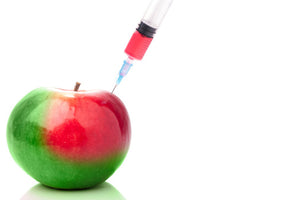The Push for Required GMO Labeling
June 09, 2014

It’s easy to read the label of a product and find out what’s in it – whether it contains additives or preservatives – but if you want to know whether the ingredients have been genetically engineered, you’re out of luck. There’s currently no labeling requirement for products made with genetically-modified ingredients, or GMOs. Genetically modified organisms are animals or plants that have had their DNA, the genetic material that codes for their most fundamental characteristics, altered. What’s the purpose? To produce plants and organisms with some survival, yield or nutritional advantage – resistance to pesticides for example.
GMOs aren’t proven to be harmful, but there are also no peer-reviewed scientific studies showing they’re safe either. As a result, many consumers are concerned that they are unwilling “guinea pigs” in an experiment designed by the biggest proponent of GMOs, the agricultural giant Monsanto. It’s not easy to opt out of the “great experiment” when close to 70% of non-organic packaged foods you find at the local supermarket are made with genetically-modified ingredients. Even worse, there’s no way to identify these products because there’s no mandatory labeling law. Reach for a few items at your local grocery store and it’s likely more than one contains genetically-modified ingredients. Products made with soybean oil, corn oil, cottonseed oil, corn and sugar beets are among the top genetically modified foods. In addition, most livestock in the United States is raised on genetically-modified corn or soybeans. Plus, the growth of GMOs shows no signs of slowing down. In the works is genetically-modified salmon that grows faster.
How do consumers feel about the invasion of GMOs AND the lack of transparency? According to a 2013 survey by the New York Times, 93% of respondents supported GMO labeling. Not surprising. After all, shouldn’t you have a right to know what you’re putting into your body? Apparently, a few states think so. Vermont holds the distinction of being the first state to mandate labeling of products containing GMOs. This law will go into effect on July 1, 2016. Two other states, Maine and Connecticut, have passed similar labeling laws, although it is contingent on at least four other states passing similar laws. Although California and Washington failed to pass GMO labeling legislation, the labeling laws in Vermont has created awareness of the issue, and, hopefully, momentum in its favor. At least 64 countries worldwide now require GMOs to be labeled.
Why the resistance to GMO labeling? The FDA points out that genetically-modified foods are not materially different from non-modified ones. As such, there is no requirement they be labeled as such. In addition, the FDA argues that there is no evidence that GMOs pose a health threat. Of concern are studies from Russia and Europe showing animals that ate genetically engineered food had enlarged organs and died early. No one knows exactly how altering an organism’s genetic material using biotechnology really impacts organisms that humans consume. There is evidence that genetically engineering damages proteins. Plus, changing an organism’s proteins by manipulating their genes may lead to proteins that trigger toxic or allergic reactions in certain people. Needless to say, there are lots of unanswered questions.
Whether or not GMOs are safe, the question still remains – do people have the right to know what they’re eating and whether it’s been genetically modified? For a growing number, the answer is yes. Over 1.4 million concerned citizens signed the Center for Food Safety’s petition encouraging the FDA to require labeling of GMOs. In addition, millions of people around the world are participating in marches to support GMO labeling. This is very much a grass-roots battle, with individuals at the State level pushing for labeling, and industry-backed lobbyists at the Federal trying to defeat it. Who will win this “cash vs conscience” battle remains to be seen. Meanwhile, at Natren, we are doing our part to be GMO-free. None of our probiotics use genetically engineered ingredients, and we proudly state this on our label. We know our customers value this, and perhaps that ought to say something to our elected lawmakers!
The post The Push for Required GMO Labeling appeared first on Natren Probiotics Blog.





Leave a comment